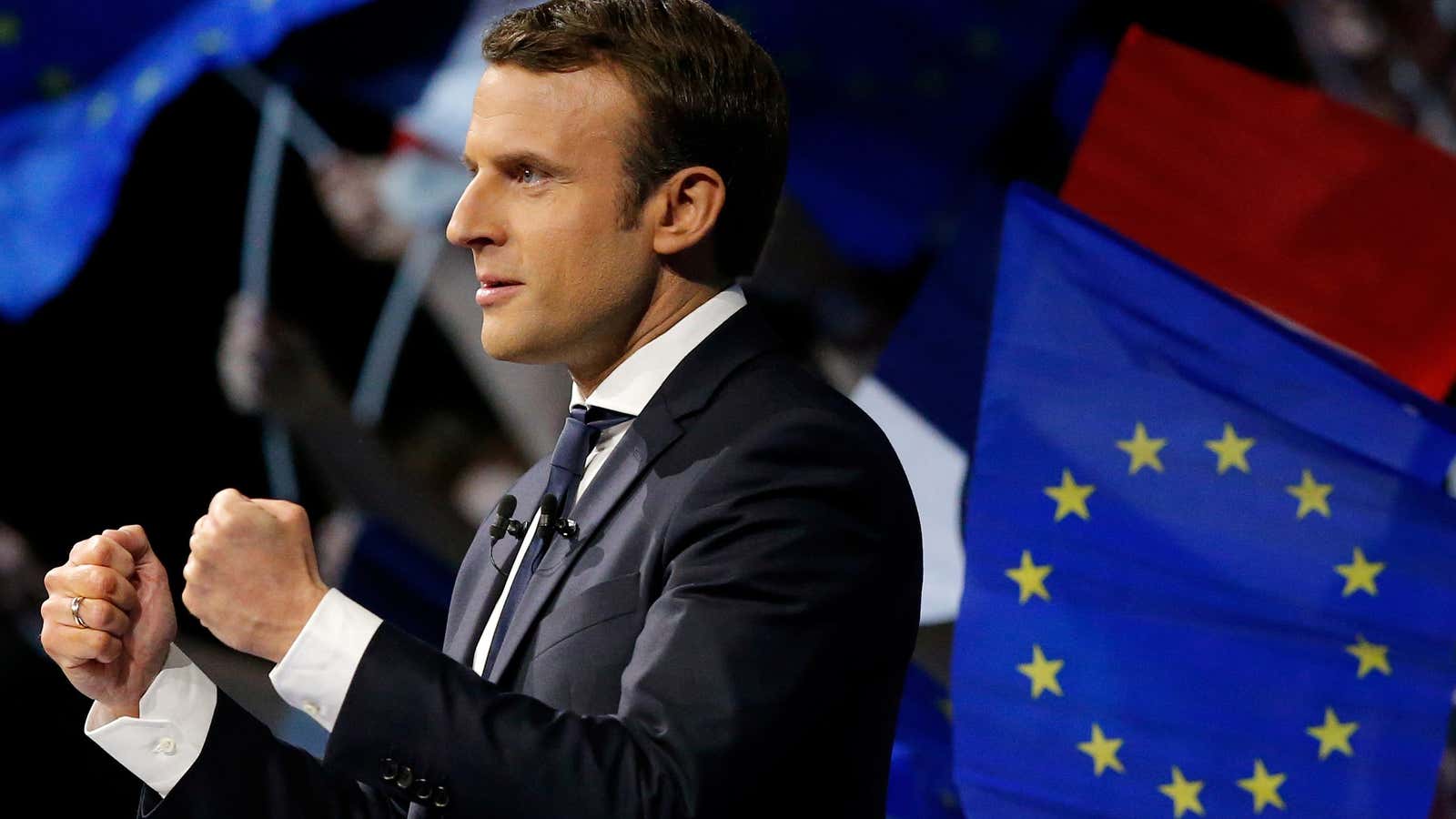After all that was made about the rise of Marine Le Pen and her far-right National Front, and after an eleventh-hour campaign hacking that bears the hallmarks of Russian meddling in Western elections, France has chosen the 39-year-old Emmanuel Macron to succeed the 62-year-old François Hollande as president. So, what have you been doing with your life, lately?
France has a population of 67 million. It has nuclear weapons and a nuclear-powered aircraft carrier, which is the only vessel of its kind not controlled by the US Navy. It has the world’s seventh-largest economy and controls overseas territories in South America, the Caribbean, and Africa. And at the helm of it all will soon be a man who hasn’t yet cracked his fifth decade on the planet.
Macron’s age takes absolutely nothing away from his accomplishments. It burnishes them. His political movement, En Marche, which he founded, is barely a year old. Political commentators can’t help but call him the French Bill Clinton or Tony Blair. While Clinton was the third-youngest US president ever elected, he was already 46. Blair took the premiership of the UK in 1997, four days before his 44th birthday. Both leaders were boy wonders of a sort, but both had also toiled in retail politics for years before reaching high office. Macron, meanwhile, only began his rise in 2012, with a role on Hollande’s staff, before becoming France’s economic minister under prime minister Manuel Valls. Before this, Macron was a banker and a member of the Socialist party.
There are indeed similarities among Macron, Clinton, and Blair, mainly in their shared belief in a third way—a vaguely centrist yet progressive political outlook that posits both the far left and far right have got it wrong. The trick is to be socially liberal and fiscally conservative. If only the parties would abandon their extremes and come together somewhere reasonable in the middle, all would be well. Macron calls this posture radical centrism. It’s an unfortunate oxymoron, but in this election, against far more extreme views, it struck the right balance for moderate voters who still wanted to feel they were fighting for something.
In the 1990s, during a pre-9/11 era of relative peace and prosperity and the first dot-com boom, it was hard to argue against the third way. But from the vantage point of 2017, we can see that the era of terrorist upheaval was already beginning, with the 1993 bombing of the World Trade Center, the terrorist attack on the USS Cole in 2000, and the rise of Al Qaeda in the Middle East. At the same time, though the free-trade deals of the era did wonders in elevating large swaths of the world out of poverty, it’s clear that developed economies were caught entirely unprepared for the decimation of their manufacturing and industrial bases, and the rise of automation in replacing manpower with robots.
To be fair, foreseeing terrorism for the problem it would become, convincing legislatures to spend on job retraining, proposing laws that would expand the social safety net and protect workers from descending into a new kind of poverty—to say that anticipating these issues and preparing for them would’ve been hard would be to severely understate the problem. Clinton and Blair would’ve needed a crystal ball.
With US president George W. Bush’s massive tax cut and misguided wars after 9/11, the third way lost momentum and favor, first to the partisan gridlock that his successor, Barack Obama, steeled himself through, and then to the rise of populism and nationalism as expressed in the 2016 election of Donald Trump, and the promises of Macron’s last standing opponent, Marine Le Pen.
This history is the crucible in which Macron’s worldview was formed. But, while he is not a political enigma, no one know what lessons in exercising power he has taken from seeing the third way rise and fall.
For what it’s worth, researchers say that creative breakthroughs often come to people in their late 30s. Writing in the Atlantic, Olga Khazan explained the phenomenon, looking at everyone from musicians to scientists and examining why this is the case. It comes down to just the right combination of age and experience—the sweet spot—that allows a person to be familiar enough with the contemporary problems facing in their field, but not bound to old ideologies or stale ways of looking at the issues. Khazan writes that “genius, it seems, happens when a seasoned mind sees a problem with fresh eyes.”
Without calling Macron a genius, he is poised to be the second Generation X president of a major world power, following Justin Trudeau’s ascent in Canada. (Generation X in France is called Generation Bof, which loosely translates to “Generation Whatever.”) Considered slackers by Baby Boomers, who as it turns out were busily destroying the economy and world order created by the Greatest Generation, Gen X is slowly but surely inheriting the mantle of leadership. Spicoli has grown up and put on a tie, and is trying to rationalize a way forward in a world where slacktivisim isn’t sufficient, and where protesting against the WTO has become irrelevant.
If you subscribe to generational theories at all, and to be sure, the jury is out, Gen Xers grew up in the shadow of the Boomers’ successes and failures, but with little power to influence them. Some dropped out of the race, yes, but some quietly prepared for the day when they wouldn’t be beholden to the world that their elders created. Even at 39, while the eyes may be a bit weary given the scenery, the mind is still fresh, and the problem is apparent. What isn’t is the fix—the way out of our present global crisis. The question we won’t know until much later is how carefully Macron has been studying the problem and how ready he is to act with durable solutions.
